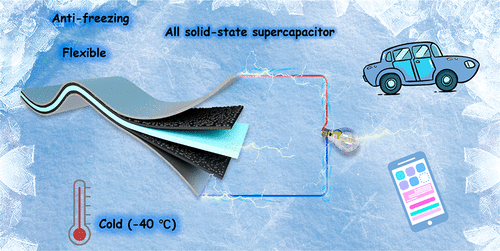当前位置:
X-MOL 学术
›
ACS Appl. Energy Mater.
›
论文详情
Our official English website, www.x-mol.net, welcomes your
feedback! (Note: you will need to create a separate account there.)
Rational Design of Antifreezing Organohydrogel Electrolytes for Flexible Supercapacitors
ACS Applied Energy Materials ( IF 5.4 ) Pub Date : 2020-01-13 00:00:00 , DOI: 10.1021/acsaem.9b02379 Nan Lu 1 , Ruiqi Na 1 , Leibo Li 1 , Chongyang Zhang 1 , Zhuoqi Chen 1 , Shuling Zhang 1 , Jiashuang Luan 1 , Guibin Wang 1
ACS Applied Energy Materials ( IF 5.4 ) Pub Date : 2020-01-13 00:00:00 , DOI: 10.1021/acsaem.9b02379 Nan Lu 1 , Ruiqi Na 1 , Leibo Li 1 , Chongyang Zhang 1 , Zhuoqi Chen 1 , Shuling Zhang 1 , Jiashuang Luan 1 , Guibin Wang 1
Affiliation

|
Hydrogel electrolytes have gained significant attention in the field of flexible supercapacitors for their intrinsic safety, high flexibility, and superior ionic conductivity. However, the water-rich structures of traditional hydrogel electrolytes inevitably cause them to freeze at subfreezing temperatures, which therefore limits the application of flexible supercapacitors at extremely cold temperatures. Herein, an organohydrogel electrolyte was successfully fabricated by displacing a portion of water molecules from hydroxypropyl cellulose/poly(vinyl alcohol) (HPC/PVA) hydrogel with LiClO4 water/glycerol mixture solution. The introduction of glycerol and inorganic salt into the hydrogel matrix can effectively preclude the ice formation of water at subfreezing temperatures. The flexible supercapacitor comprising the optimal antifreezing organohydrogel electrolyte exhibited excellent mechanical and electrochemical stability at subfreezing temperatures. Even if the temperature decreased to −40 °C, the supercapacitor could also deliver a specific capacitance of 143.6 F g–1 (73.75% of the one delivered at 20 °C) with Coulombic efficiency approaching ∼100%. Meanwhile, the electrochemical performance of the supercapacitor could also be well maintained under different bending conditions. It is believed that this work will play an exemplary role for designing antifreezing gel electrolytes for flexible energy storage devices using at extremely cold environments.
中文翻译:

柔性超级电容器防冻有机水凝胶电解质的合理设计
水凝胶电解质因其固有的安全性,高柔韧性和优异的离子传导性而在柔性超级电容器领域引起了广泛关注。然而,传统水凝胶电解质的富水结构不可避免地导致它们在低于冰点的温度下冻结,因此限制了柔性超级电容器在极低温度下的应用。本文中,通过用LiClO 4取代了羟丙基纤维素/聚乙烯醇(HPC / PVA)水凝胶中的一部分水分子,成功制造了有机水凝胶电解质。水/甘油混合溶液。在水凝胶基质中引入甘油和无机盐可以有效地防止亚冰点温度下水的冰形成。包含最佳防冻有机水凝胶电解质的柔性超级电容器在亚冰点温度下表现出出色的机械和电化学稳定性。即使温度降至−40°C,超级电容器也可以提供143.6 F g –1的比电容。(在20°C下输送的73.75%),库仑效率接近〜100%。同时,在不同的弯曲条件下,也可以很好地保持超级电容器的电化学性能。相信这项工作将为设计用于极冷环境下的柔性储能装置的防冻凝胶电解质起到示范作用。
更新日期:2020-01-13
中文翻译:

柔性超级电容器防冻有机水凝胶电解质的合理设计
水凝胶电解质因其固有的安全性,高柔韧性和优异的离子传导性而在柔性超级电容器领域引起了广泛关注。然而,传统水凝胶电解质的富水结构不可避免地导致它们在低于冰点的温度下冻结,因此限制了柔性超级电容器在极低温度下的应用。本文中,通过用LiClO 4取代了羟丙基纤维素/聚乙烯醇(HPC / PVA)水凝胶中的一部分水分子,成功制造了有机水凝胶电解质。水/甘油混合溶液。在水凝胶基质中引入甘油和无机盐可以有效地防止亚冰点温度下水的冰形成。包含最佳防冻有机水凝胶电解质的柔性超级电容器在亚冰点温度下表现出出色的机械和电化学稳定性。即使温度降至−40°C,超级电容器也可以提供143.6 F g –1的比电容。(在20°C下输送的73.75%),库仑效率接近〜100%。同时,在不同的弯曲条件下,也可以很好地保持超级电容器的电化学性能。相信这项工作将为设计用于极冷环境下的柔性储能装置的防冻凝胶电解质起到示范作用。











































 京公网安备 11010802027423号
京公网安备 11010802027423号